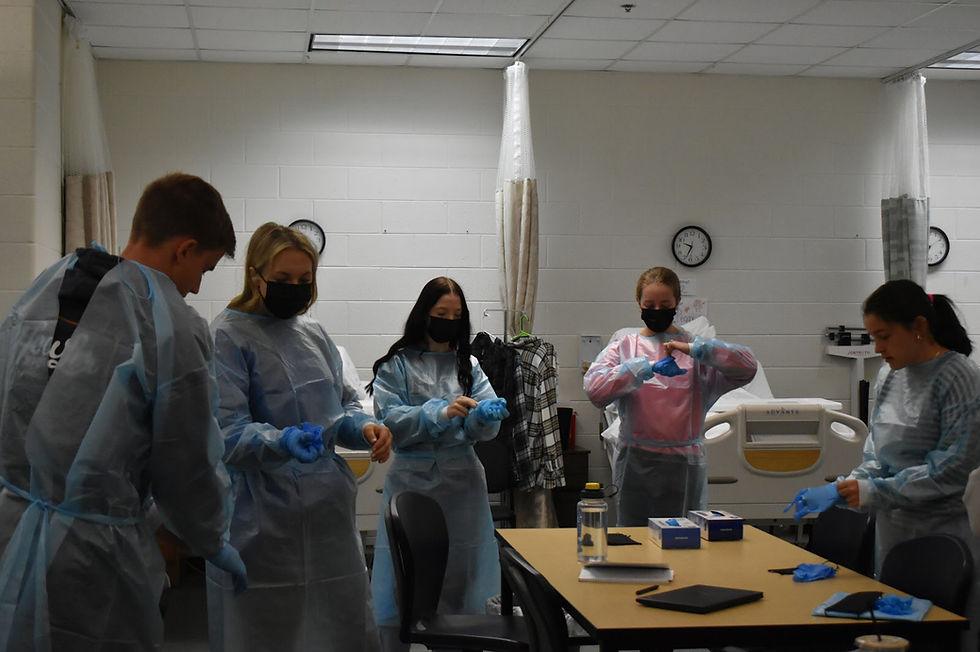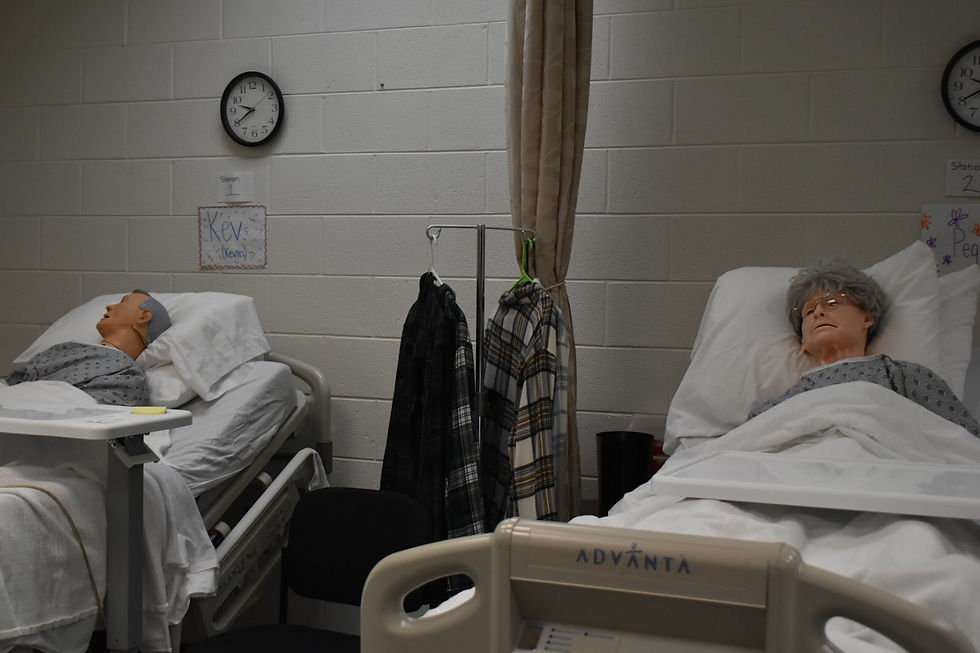Nursing Fundamentals Students Are Learning How to Save Lives
- Rebecca Billette

- Sep 24, 2025
- 5 min read

Ms. Miller’s Nursing Fundamentals class practicing the proper technique of putting on their gowns, gloves and masks. Pictured left to right: Solomon Triplett, Emma Pastusic, Shelby Thompson, Anna Koontz and Annie Willis, all seniors. Students in this class take notes and learn skills in preparation for their clinical experience later in the semester. “Most of us after clinicals will most likely get a job to continue our CNA. It's definitely a great way to make more money and save up money for our future. And it does prepare us by helping us talk to patients and handle patients,” said Koontz. Photo Credits: Rebecca Billette
Rebecca Billette, Editor-in-Chief of The Powderhorn
For the average student at Watauga High School, a typical day of class follows a conventional schedule, learning algebra, writing essays in English, and taking notes in history. However, stowed away in the CTE hallway on the first floor, the students in the Nursing Fundamentals class are learning how to save lives.
“We have first and second block, and first block is usually notes,” said Larson Berry, a senior in the Nursing Fundamentals class. “We take notes on infections and all the different bookwork, and then second block, we do skills, which we have to check off of to be able to continue in the class. And then the skills are blood pressure and pulse and respiration and stuff like that.”
The Nursing Fundamentals class is a double block, meaning students commit half their school day to preparing themselves for a career in the medical field. Many of the notes they take and skills they check off on may seem easy on the surface, but are far more complicated in practice.
“We take blood pressure- we do really simple things, like changing sheets, but we have to do it with someone in the bed, and it's really different,” said Solomon Triplett, senior.

The dummies (Kev and Peggy) that Mrs. Miller’s Nursing Fundamentals class uses to simulate patients when practicing their skills. Photo Credits: Rebecca Billette
After checking off on the necessary 72 skills, the Nursing Fundamentals students move on to “clinical.” This is a hands-on learning experience where students actively take care of geriatric patients at Deerfield Ridge Assisted Living in place of their first and second block. This allows the future healthcare professionals to gain firsthand experience with patients, and decide for themselves if a career in nursing is the right path for them. This opportunity is not a guarantee, however, but a privilege.
“We do at least 40 hours in a skilled nursing facility, and they do the work,” said Heather Miller, the Nursing Fundamentals teacher at Watauga High School and registered nurse. “They take care of the patients, they bathe them, they shower them, they feed them, they change their clothes, and they're able to do that under my nursing license, which is why it's such a small group. And that is why there is such emphasis on the training, because I have the liability in that situation.”
The Nursing Fundamentals class provides invaluable knowledge and experience for students, not just those with a set dream of nursing, but anyone interested in pursuing a career in healthcare.
“I'm hoping to go into biomedical engineering, which isn’t really based in the hospital, but it does involve helping others, and that's what I like to do,” said Koontz. “That's why the CNA position and class really interested me, because I would like to help people and kind of get experience for those who I might be helping in my future career as well.”
Watauga High School’s nursing program does not only consist of one class, however. Students in this program dedicate time and effort throughout their entire high school career to pursuing this education. They follow a set path of classes that ultimately prepare them for the hands-on experience they gain in Nursing Fundamentals.
“Our first one is Foundations of Health Science, and they learn everything from medical terminology to prefixes and suffixes and medical math, and then they do a deep dive into possible healthcare careers,” Mrs Miller said. “From there, it is Health Science I, and that is Anatomy and Physiology with a different name. They go over all the body systems, they learn about how the body functions properly and then what it looks like under disease processes. Then in Health Science II, which is usually their junior year, they get trained in basic life support CPR. They do OSHA training, STOP THE BLEED training, and we do everything from professionalism and we learn about how to properly care for patients of different cultures.”
With such a comprehensive curriculum, the students in Watauga High School’s nursing program have a lot on their plates. They are also faced with unique obstacles that are difficult to overcome. Whereas the archetypal high school students may struggle with lots of homework, or a difficult math problem, these students face far different mental challenges.
“Probably the biggest obstacle is maybe just hearing about some of the things we have to do, like lifting people or getting people out of bed. It sounds daunting at first, but once you do this skill, it becomes easier and you feel more prepared,” Berry said. “But some of the skills can definitely be overwhelming at the start.”
Between the large workload, difficult tasks and time commitment, the students of Nursing Fundamentals must be dedicated and make certain sacrifices. However, it is a very rewarding learning path, and sets students up to enter the healthcare field with a sense of empathy and humanity. As Mrs. Miller’s nursing teacher when she was in high school, Mrs. Alford, put it, “Your Wednesday is their worst day.”
“I know that it's a big time commitment, and it can take away from any APs you might want to take, because I know I struggled with that. It's something I had to think about a lot,” said Annie Willis, senior. “But it's been the best decision I've made to take this class. It's the most fulfilling class I've ever taken.”
The nursing curriculum at Watauga High School is rigorous and time-consuming, but it provides students with a hands-on learning experience that actively prepares them for the medical field and offers them a fulfilling human-centered career path. The students in Mrs. Miller’s classroom are dedicated, passionate and eager to learn, and they encourage anyone interested in pursuing healthcare in the future to give a health science class a try.
“The advice I would give is, you need to be very committed to this program and you need to put in the time and you need to take it very seriously, because this is a real job that you're preparing for, and you just really need to know if you want to do it,” said Koontz. “But it's a great opportunity and I recommend it to anyone who's interested.”





Comments